By John Paul Obillos Dela Rosa, Tagalog Foreign Language Teaching Assistant, Northern Illinois University (Written January 2020).
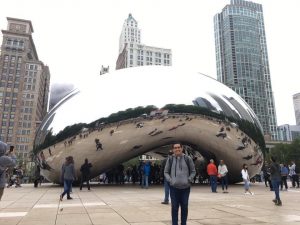
At Cloud Gate (The Bean), Millennium Park, Chicago, IL
Months have passed since I began my Fulbright Foreign Language Teaching Assistant (FLTA) journey in the United States. I still remember how my mom and I shed tears of joy when we learned that I was accepted into the Program. Before I arrived, I promised myself that I would travel and explore as much as I could, meet lots of new people, and be an enthusiastic cultural ambassador for my country. While I expected that some things would change, I did not realize that my FLTA experience would drastically impact my life, especially the way I look at the world. One important thing that I’ve learned is the value of cross-cultural communication and how intercultural competence has been nurtured by my FLTA experience.
LIVING WITH MY CO-FLTAs FROM SOUTHEAST ASIA
As an FLTA at Northern Illinois University (NIU), I live in a student dormitory on campus with four other FLTAs from Southeast Asia: Bunga (Indonesia), Su Su (Myanmar), Ildi (Indonesia) and Songwut (Thailand). While we all come from the ASEAN region, we are very different from one another. From how to correctly pronounce the names of our countries, individual food preferences, families and personal life–each of us has our own beliefs and aspirations that are mostly dictated by our cultures. The experience of living with other FLTAs has given me a deeper understanding of cross-cultural communication that reading in a book alone could not provide. The five of us get along really well. Funny as it may seem, we share one common interest: we always enjoy taking photos when there is snow! This has been an exciting activity for us FLTAs at NIU, seeing snow and experiencing winter for the first time!
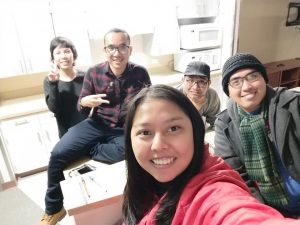
My FLTA colleagues from Southeast Asia— Su Su (Burmese), Thor (Thai), Bunga and Ildi (Indonesian)
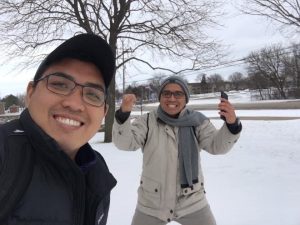
My Indonesian FLTA friend and I , Ildi, are enjoying the pristine white view of DeKalb, IL on New Year’s Eve.
IMMERSING MYSELF INTO A NEW CLASSROOM ENVIRONMENT AND WORKPLACE
At NIU, the classroom culture and workplace environment are different in comparison to the Philippines. The concept of personal space in American culture is also essential to understand. I consider myself a big “hugger” just like many other Filipinos, but with my current students, I had to learn how to respect their personal space.
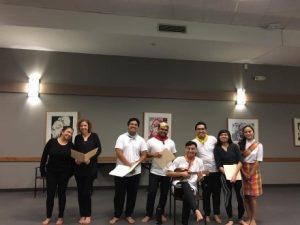
Our Beginning Tagalog students serenading the audience with a nostalgic Tagalog song during the Southeast Asia Cultural Night at Northern Illinois University (NIU) back in October.
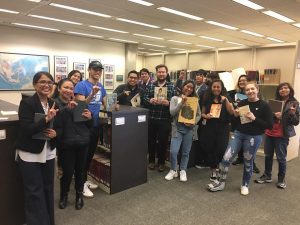
Exploring the Southeast Asia Collection of Founder’s Memorial Library at NIU with my supervisor, Prof. Rhodalyne Gallo-Crail, and our Tagalog students.
Workplace culture is different in the United States, too. Having an open mind matters, and criticisms are not always negative; they are meant to help improve ourselves. I learned that I do not have to go around in circles and worry too much if I’m unable to say “yes” to an offer or a favor asked. I have always been very circular in terms of how I communicate with people, but here in the United States, I learned how to be more direct in the workplace. Punctuality is of prime importance in American culture., as well. Respecting time is respecting other people’s time.
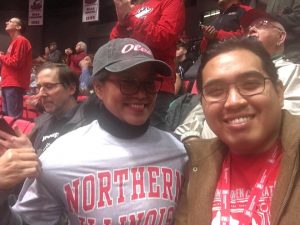
Working with my supervisor at NIU is a great learning experience. I consider her the coolest and smartest mentor I’ve ever had. She is no less than Prof. Rhodalyne Gallo-Crail, my Ate Rhoda.
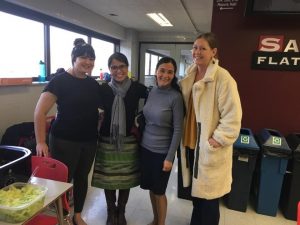
A photo opportunity with the kind-hearted employees of Northern Illinois University. I am fortunate to have been hosted by a caring and nurturing academic community!
CONNECTING TO THE REST OF THE COMMUNITY
Another exciting aspect of being an FLTA is connecting with my host community—lending a helping hand, spreading positivity, and sharing my language and culture. I was able to meet Americans from all walks of life, with different professions, old and young. They all have their own opinions about things. Some are the same as mine, some are not, but what I learned deeply is the value of listening to other people and respecting them, no matter what their opinions are. That is one important aspect of becoming an interculturally competent individual. We need to meet halfway, with open minds and hearts.
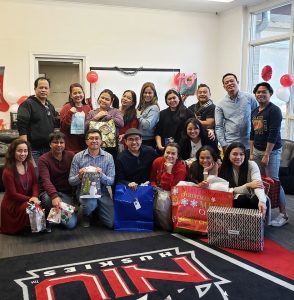
Striking a Yuletide pose with my second family in DeKalb, Illinois—the Kishwaukee Filipino-American Community.
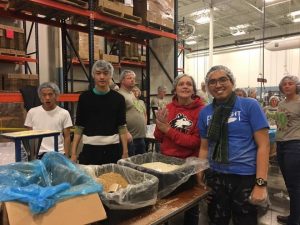
It was a fulfilling experience to be part of “Feed My Starving Children,” a non-profit organization that provides free and healthy meals to the many starving children around the world.
I am also sharing this one, big community of mine with my colleagues from the FLTA Program. The thought that one has friends from all over the world who share the same passions and interests is always exciting! I have met and made friends with other FLTAs from Egypt, Spain, Argentina, France, Taiwan, Japan, Pakistan, and other parts of the world. We still exchange teaching strategies and share our great adventures across the United States. Two of the most memorable encounters I have had in the United States were our Summer Orientation at The University of Arizona, and of course, the FLTA Midyear Conference in Washington, D.C.

A rare opportunity to be photographed with Assistant Secretary of State for the Bureau of Educational and Cultural Affairs (ECA), Marie Royce, and other FLTAs who are constantly involving themselves in different community outreach activities.
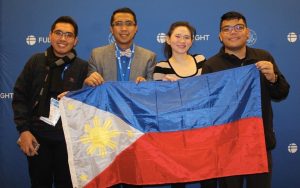
The happiness felt to represent one’s country as an FLTA is incomparable. I share the same feeling with other Filipino FLTAs who were with me during the 2019 FLTA Midyear Conference in Washington, D.C.
We only have few days left before we say goodbye to our host institutions. I hope my co-FLTAs have also found ways on how to nurture their intercultural competence. May we all replace judgment with curiosity and let cultural understanding reign on this beautiful FLTA journey!
